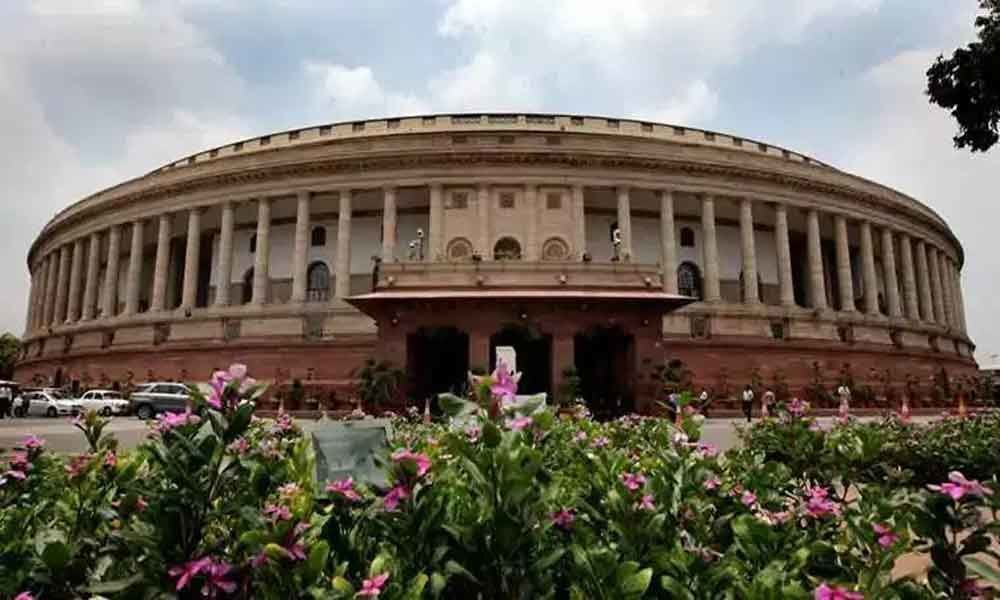Live
- Bajaj Auto overtakes Ola Electric as top 2-wheeler EV company
- Supreme Court to hear on Thursday plea challenging designation of senior advocates by Delhi HC
- Manipur violence: Much effort made, lot remains to be done, says CM Biren Singh
- 2025 New Year Affirmations: Inspiring Words to Start the Year Positively
- Man Sentenced to Death for Killing Three Children, Attempting Wife’s Murder
- Machilipatnam Police serve notices to Perni Jayasudha in ration rice case
- Devotees Flock to Vemulawada Rajarajeshwara Swamy Temple for New Year Blessings
- Former India head coach Shastri calls for implementation of two-tier Test system
- After bountiful rains, northeast monsoon withdrawal from TN expected from Jan 15
- Today’s Horoscope January 1, 2025: Get Your Daily Astrological Guidance for all Zodiac Sign
Just In
Budget Session may start from July 8: Finance Ministry


Parliament is likely to start discussion on the General Budget on July 8 while voting on Demands for Grants is likely between July 11-17 as the Narendra Modi government presents the first Budget of the second term on July 5.
New Delhi: Parliament is likely to start discussion on the General Budget on July 8 while voting on Demands for Grants is likely between July 11-17 as the Narendra Modi government presents the first Budget of the second term on July 5.
"The tentative dates for discussion and voting on demands-for-grants for 2O19-20 are expected between July 11-17. The general discussion on Budget is tentatively scheduled on July 8," a communication from the Finance Ministry's Budget division said.
Finance Minister Nirmala Sitharaman faces an uphill task. She has to rescue Asia's third-largest economy from the brink of a major slowdown. In May, India lost its spot as the fastest-growing major economy in the world though government said it still is the fastest growing.
India's GDP slipped to a 5.8 per cent growth in the last quarter of FY19, down from 6.6 per cent in the previous quarter, and lower than the 6.4 per cent growth registered by China. The consumtion demand and investment cycles are the lowest pressing for higher government spending in a year when revenues are on the downside. Job creation is missing with unemployment at the highest 6.1 per cent.
Sitharaman also has to meet a tough disinvestment target in a slowing economy and tough market to expand the government kitty in a year when tax revenue are almost certain to be lower. The government is looking to garner Rs 90,000 crore from disinvestment, up from Rs 85,000 crore it got last year. The bulk of last year's earnings, however, came from the central public sector enterprise (CPSE) exchange-traded fund (ETF), a pool of PSU shares, as against the government's desire to sell strategic stake in government-owned companies.
This fiscal government will milk the current ETFs and launch new ETFs like financial sector ETF and debt ETF. So far the government raised Rs 2,350 crore in the first two months of the current fiscal. To kickstart the disinvestment process, Niti Aayog, a think-tank of the government has suggested 35 PSEs where the government is likely to sell its stake. Recently government said Air India will be attempted to be sold. Last year too, the government had tried to sell Air India, but it didn't find any takers.
Both Direct and Indirect Tax revenues are also not matching the huge agricultural package the government is giving like the recent Rs 87,000 crore expense, up from Rs 75,000 crore for the Direct Income Scheme for the poor and marginal land farmers. With a slowdown gripping the economy, the non-tax revenues like CPSE profits and dividends are also not on higher trajectory.
Besides laying the roadmap, the Finance Minister's challenge will be a tightrope walk between containing the fiscal slippage and handling growth slowdown. The latter, due to slowdown in consumption, exports and gross domestic capital formation, calls for an economic stimulus package which is at odds with the objective of fiscal consolidation.
Fiscal deficit at 3.4 per cent will be difficult to maintain, but credit rating agencies warn of downgrade for India should it fall, making raising capital for Indian companies costly. It will also raise the interest costs of the government while FIIs will shy away.
But at the same time she will have to fulfil the common man's aspirations as it is the common man which has voted her party back to power for the second time with as the largest party.

© 2024 Hyderabad Media House Limited/The Hans India. All rights reserved. Powered by hocalwire.com






